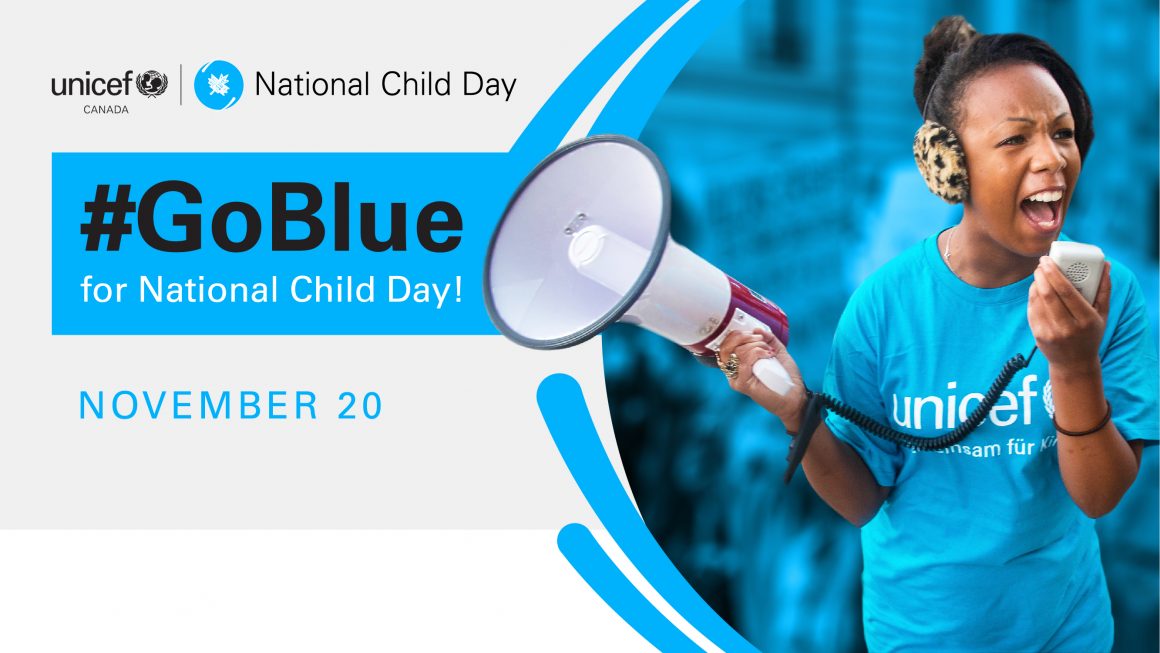
Go Blue campaign raises awareness for National Child Day
By Cristina Paolozzi, November 19 2021—
On Nov. 20, UNICEF Canada is asking Canadians to Go Blue to commemorate National Child Day. This day marks the date that the United Nations Convention on the Rights of the Child came into effect in 1989, and this year, the Calgary Tower — along with other Canadian landmarks — will take part by glowing blue in support of the sacrifices made by children over the course of this pandemic.
Children around the world have experienced disruptions in their development, like inconsistent school schedules, lack of social interaction and a brand new way of life for almost the past two years.
While everyone experienced drastic changes to their daily lives as a result of COVID-19, UNICEF Canada wants to recognize how much children specifically contributed to helping stop the spread — altering future generations’ upbringing and personal experiences for years to come.
UNICEF Youth Advocate and second-year student at the University of Calgary, Reeana Tazreean, spoke to the Gauntlet about National Child Day and the Go Blue campaign.
Tazreean said that this day is meant to celebrate everything that the youth of the world contribute to society, and to recognize the impact young people had during the course of the pandemic.
“It’s really just a day to spread awareness on all the rights that children have and to ensure that every child is aware of what their fundamental rights are,” she said. “And also just to celebrate all the amazing work that young people are doing all over the country.”
Tazreean said that UNICEF Canada hosted a Youth Act program, which saw advocates like Tazreean meet with youth across the country and conduct consultation to ask how the pandemic has directly impacted them.
“Something that we found was that mental health challenges was a common thread among all the provinces and territories,” she said. “And we predict that this is due to the disruption in schooling, resulting in impacts on their cognitive development, as well as a lack of personal connection with our peers and just a huge shift in our day-to-day living.”
UNICEF Canada is encouraging people to participate in their Go Blue campaign by checking out their Go Blue toolkit.
“We’re encouraging all the adults to recognize the sacrifices that children have made, and just taking a moment to hear how they’re feeling, check in with them and really stand in solidarity with them.”
Tazreean said that she’s passionate about this work as her own personal experiences have contributed to the way she views the losses experienced these past two years.
“I was a person living in this world, seeing all these issues arise right in front of us — I think it’s our duty to do something,” she said. “Regardless of the scale of our work, I think it’s really important that we collectively take action.”
On Nov. 19 is also the Youth Activism Summit hosted by UNICEF Canada, which will have young people speaking up and sharing their recommendations on issues like climate change, disability and accessibility, racial justice, mental health and Indigenous rights.
With the recent controversies surrounding summits like COP26 in Scotland, Tazreean said it’s easy to become discouraged as a youth advocate, constantly pushing for change without seeing any meaningful action. However, she also said that the Youth Activism Summit is a space that allows for meaningful conversations among varying groups to people to really listen and engage with current pressing issues.
“During the Youth Activism Summit, there are three key stakeholders,” she said. “We have young people, adult allies and decision makers and policy makers. I think something that makes the Youth Activism Summit at UNICEF really special is we always have an intergenerational panel, and this allows for everyone — all ages, all experiences, all walks of life — to just be on the same level.”
Tazreean was passionate in relating that it was young peoples’ experiences that would be the focus of these panel discussions.
“Especially in the context of the pandemic, the young people are the experts in their experiences,” she said. “So regardless of policy makers’ experiences — obviously that’s important and that has value — but young people also have value.”
Tarzeean mentioned that if there were any students who would like to get involved as a Youth Advocate, to check out UNICEF’s website, which lists resources and recommendations as well as further information about how to get involved.
“It’s really important for young people to know that they’re not alone when it comes to advocating for issues,” she said. “It can often feel like overload, and it can feel burdensome when we see all these issues and challenges in the world. But they’re not alone — there are other young people there to support them. And even though sometimes it feels like the adults in the room aren’t listening, I think there’s definitely been progress.”
For more information on UNICEF Canada’s Go Blue campaign, visit their website.
